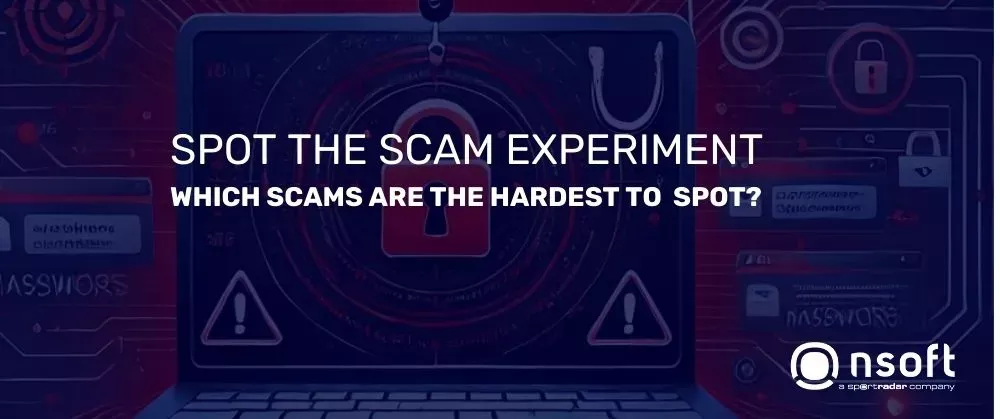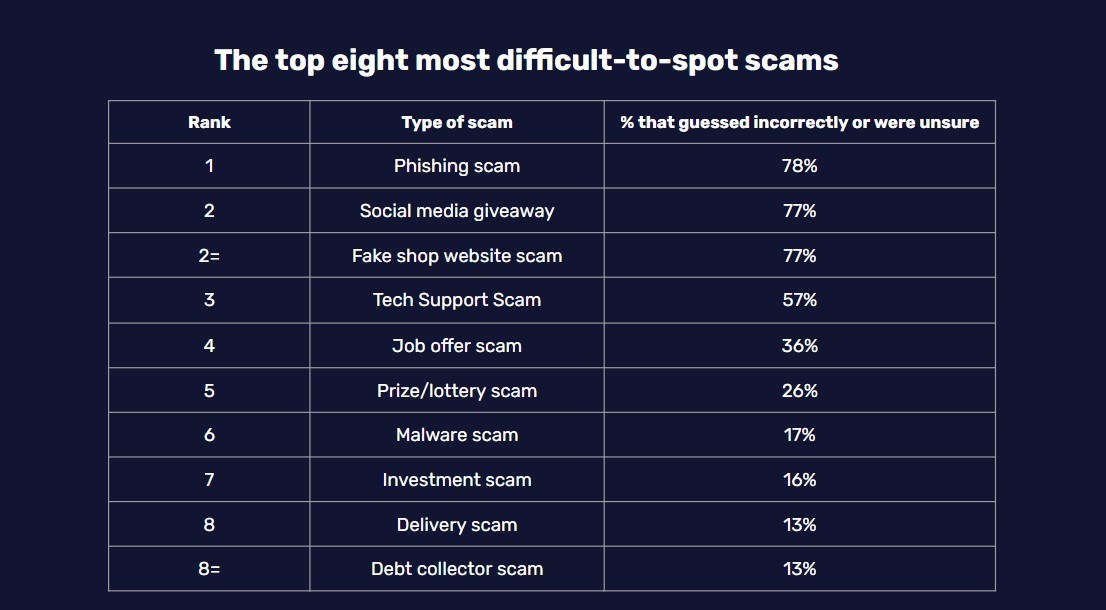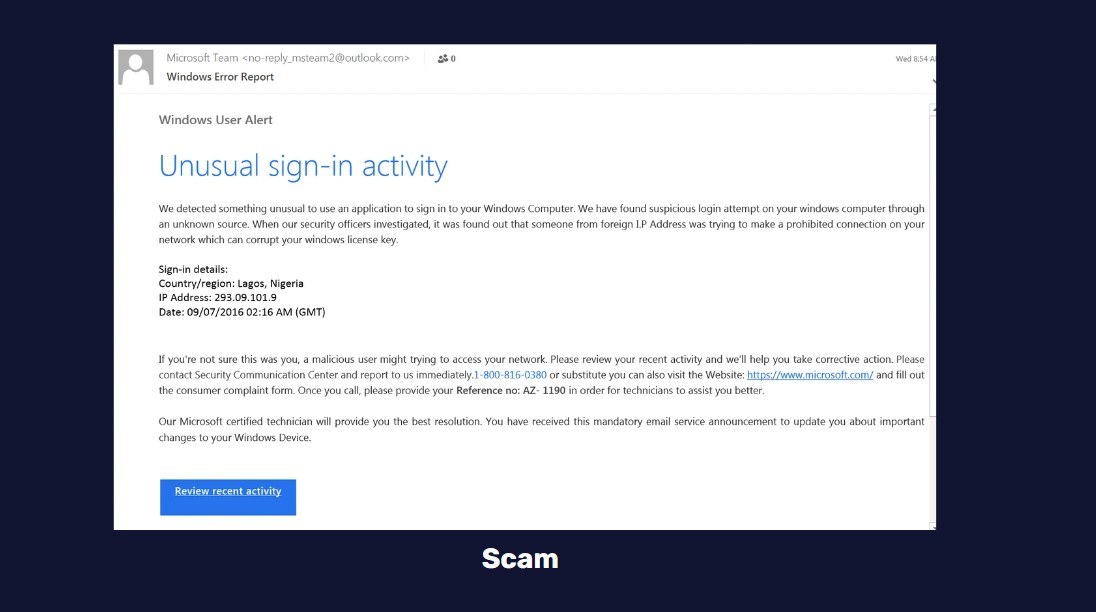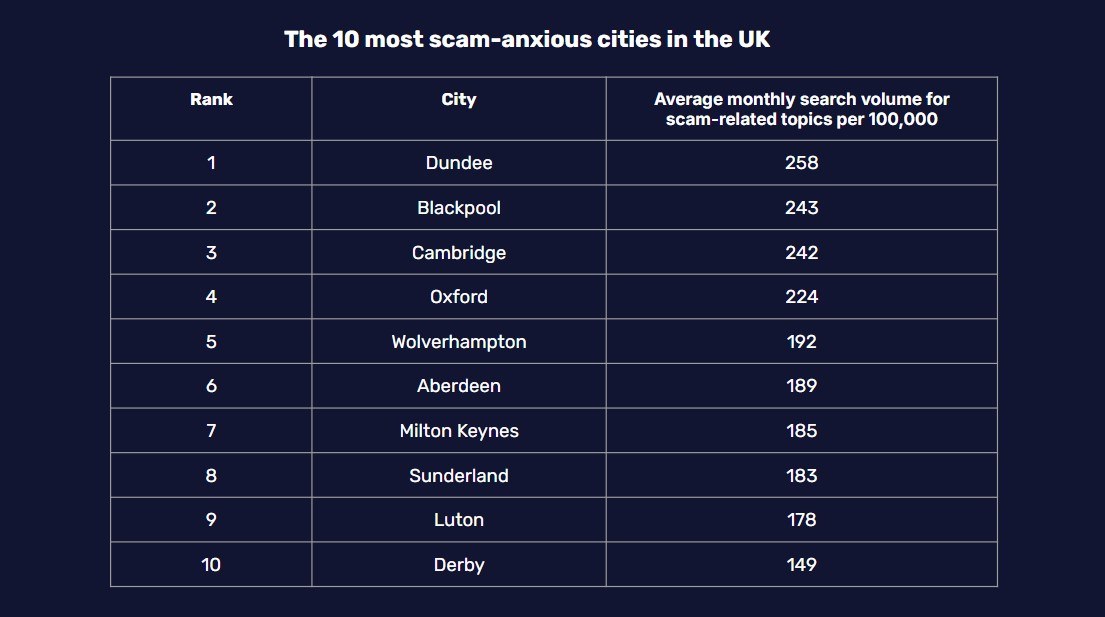News / Interviews & Editorials
Which scams are the hardest to spot?

The nature of a scam has evolved as quickly as the technology around us. Scams are no longer limited to suspicious emails; today, they can come through in the form of a text message for an unpaid delivery fee, or unknowingly purchasing a fake ticket to see your favourite band. In the past year, a staggering nine million people in the UK have fallen victim to financial scams alone, but which scams do Brits struggle to identify the most?
By learning more about what scams to look out for and what they look like, you can reduce your chances of being caught out by one. That’s why the team at nsoft conducted an experiment to see which scams are the hardest to spot, and how you can identify them before you fall for them. Our findings aim to empower you with the knowledge and tools needed to recognise and avoid scams, keeping you and your information safe.
The experiment: Which scam is the hardest to spot? #
Scammers are always changing their methods to try and catch their victims, making it harder to spot the telltale signs of their schemes. With Google searches for ‘is this a scam’ increasing by 51% in the last year, the UK public needs help to weed out the fake from the genuine. But which scams are the hardest to identify and therefore pose the biggest risk?

1. Phishing scams #
While 90% of respondents were familiar with phishing scams, 78% incorrectly identified the phishing examples in our survey. Scammers disguise themselves as a legitimate company or individual, aiming to ‘phish’ personal information from you through malware-ridden links in an email or text you believe to be from a valid source. Once you click, you may become a victim of ransomware, identity theft, or data loss.
To test this, participants were shown two emails seemingly from the same work platform site. When asked which one is the legitimate email, 78% of the participants guessed incorrectly or were unsure.
A key indicator that the email was a scam was that the email address did not include the legitimate company’s name, using [email protected] instead. Phishing emails may also create a sense of false urgency to give the victim less time to consider the legitimacy of the email, such as ‘everyone else has already joined!’.

2. Social media giveaways and fake shop websites #
Our survey had a joint second position for the hardest-to-spot scam, with 77% of participants struggling to identify a fake social media giveaway or impersonated shop websites.
Social media giveaway scams mimic real brands or celebrities, setting up fake competitions with conditions similar to genuine ones, like following a page, sharing a post, or clicking a link to provide personal details. The realistic nature of these scams makes them hard to spot. Once scammers have your information, they can access your accounts, including financial and social media profiles.
Fake websites impersonating real companies can be just as tricky to spot, with over three-quarters of participants failing to identify that the two websites presented to them were scams.
Each fake website was made to look real using the correct logos and fonts used by the legitimate companies, but there were still signs that they were fake. For example, the scam site excessively used the logo on every product listing. If you ever feel that something is off with a website, be sure to check the website URL for any slight changes in spelling or do a quick Google search to see if there are other versions of the site you are viewing.

3. Tech support scam #
Over half of our survey respondents were unable to correctly identify the tech support scams given to them. While many scams aim to plant malware onto your devices, some tech support scams use viruses as their reason for contacting you, claiming that your device is at risk. Scams such as this can look like an email from PayPal claiming to have limited your account due to suspicious activity, or an advert for tech support services in web search results. Although these can be honest messages, they should be thoroughly checked before engaging with them. Otherwise, you may be putting your sensitive information into the wrong hands.
While the emails did have the correct logos of the legitimate company, the email addresses had spelling errors, or the email did not address the recipient by name. If you are ever in doubt, many companies now offer a guide on how to spot fraudulent emails disguised as them, as well as a service where they can check the email that has come from them.

Which UK cities have the most scam anxiety? #
When you think you may have come across a scam, it’s natural to turn to the internet for advice and guidance. But which cities are asking Google for help the most?

The people of Dundee appear to have the most scam anxiety, with an average of 258 monthly scam-related searches for every 100,000 people. Searches include ‘online dating fraud’ and ‘how to spot a scam email’. Each year, to help Scots identify scams, Trading Standards Scotland runs The Big Scottish Scam Survey, where they revealed that 99% of respondents had been targeted by a scam in the past year.
In second place is Blackpool, with an average of 243 monthly searches for every 100,000 citizens. Recent examples of Blackpool scams include scammers posing as Blackpool Transport on Facebook, or fake parking penalty charges through SMS text messages.
Rounding off the top three most scam-anxious cities is Cambridge, with an average monthly search volume of 242 searches for terms such as ‘phishing attacks’ and ‘credit card fraud’.
Common scams to look out for in 2025 #
The best way to guard yourself from potential scammers is to get ahead and be aware of the scams that are being used right now. Below, you will find some of the most common scam methods used throughout 2024, as well as scams to look out for in 2025:
Event ticket scams #
2024 was officially the year of live entertainment for UK fans, with Taylor Swift’s Era’s tour finally reaching Europe, and England entering the Euro 2024 final against Spain. These opportunities, however, are when ticket scammers strike, and 37% of people aged 16-34 have bought a ticket that ended up being fake or know someone who has been targeted.
Fake parcel texts #
‘Smishing’ is a combination of the words ‘SMS’ and ‘phishing’, and parcel delivery scams are one of the biggest forms of it. Fake SMS texts ask the recipient to click a link to reschedule a fake delivery or pay a delivery fee, leading them to a phishing site made to steal personal information.
Employment scams #
January and February are peak recruitment times, but it is also the prime time for employment scams to slip through the cracks. These can show up as fake job listings, where the scammer asks candidates to pay an application/screening fee, or fake email offers asking the ‘successful’ applicant to give sensitive information such as bank details or ID.
Investment or Cryptocurrency scams #
Cryptocurrency, or ‘crypto’ for short, has gained popularity quickly, with an 82% increase in UK searches for ‘crypto’ over the last year. However, with 4,400 monthly searches for ‘what is crypto’, Brits are interested but not entirely sure what it is. Scammers are benefiting from this lack of knowledge by promising to grow their money with big payouts and guaranteed returns if they buy cryptocurrency and transfer it into their online accounts. This ultimately leads to the scammer taking all the funds out of the account and the victim with nothing.
How can you protect your accounts from scammers? #
No matter how much scammers change their tactics, there are always ways to better protect your accounts from their attacks. Our Marin Marincic, Head of Infrastructure, shares how you can distinguish the fake from the real when browsing online:
1. Adjust privacy settings on social media #
Sharing your life with loved ones on social media can be great to stay connected, but be careful who you share these details with. By posting information such as your birthday, where you live, or even your pet’s name, you could be giving valuable data to a scammer. Checking before you accept friends and followers on social media can keep your account safe from prying eyes who want to scam you.
2. If it’s ‘too good to be true’, it probably is #
Scammers are good at presenting an offer you can’t find anywhere else, tempting you with a bargain you can’t refuse. When you are met with an offer that sounds too good to be true, this is a sign to be extra vigilant and double-check the legitimacy of the company or individual. If you can’t confirm whether they are who they say they are, it’s best to walk away and report the offer to Action Fraud, the UK’s national reporting centre for fraud and cyber-crime
3. Always check the URL #
Before entering sensitive information, always check that the website address starts with "https://." The "s" indicates that your data is encrypted and more secure, so if the URL only shows "http://," be cautious. The padlock icon next to the URL is also a good indicator that your communication and data is encrypted. Scammers often create fake websites that closely resemble legitimate ones by using subtle tricks like misspellings or extra characters that they hope you won’t notice.
4. Update your devices and operating systems #
While many devices and apps install updates automatically, it’s always worth checking that the updates have taken place. Patches and updates often contain new security features to help protect your data against new threats, making it harder for scammers to compromise your devices or software.
5. Only use trusted internet connections #
It’s important to only use internet connections you know are safe and private, as scammers can set up fake public hotspots to catch you out. When you join the wifi using their connection, they can see everything you do online, including any personal details you enter. To avoid this, turn off ‘auto-connect’ on all devices, and always check that you know the source of any connection you use.
Methodology #
This methodology determined which UK cities are the most concerned with scams and which scams are the hardest to spot. Here's a breakdown of how this study was conducted:
1. Google Search Volume Data Collection:
Using a seedlist of 30 UK cities, 65 different search terms were analysed to find out how many times each is being entered into Google by each city. This provided an average monthly search volume. All 65 search volumes were totaled for each city to create a total average monthly search volume. To gain a true representation, this total number was divided by the population of that city and then multiplied by 100,000 to reveal the average monthly search volume for scam-related terms per 100,000 citizens.
2. Google Forms Data Survey:
A survey consisting of 10 questions was completed by respondents. Each question asked the respondent to identify which of the images were a scam and which were legitimate.
For each question on the Google survey, the percentage of people that correctly identified the scam was noted and the percentage that did not OR selected ‘I do not know’ were grouped as one. For those that only correctly identified half of the question, these counted towards the incorrect / not sure column.
This dataset was then ranked high to low based on the percentage of people identifying the type of scam incorrectly.
Tags:
Related Articles
News / Interviews & Editorials
16.04.2025.
Beyond the Bet: How Gamification is Reshaping Online Gambling
By making the gamification elements fun, relevant, and optional, you ensure that they enhance the betting experience rather than overshadow it.
By Marko Galić, Game Mathematician & Project Manager at NSoft
Learn more
News / Interviews & Editorials
08.04.2025.
The Formula One Race Report
Attending a Formula One Grand Prix is a bucket-list experience for many motorsport fans but while the roar of the engines and the glamour of race days are undeniably exciting, the cost of attending is a luxury few can regularly afford.
We break down the true cost of attending a race weekend this season, ranking Grand Prix events. So which one offers the best value for money?
Learn more
Interviews & Editorials
13.03.2025.
The UK and US Football Stadium Report
Not all stadiums are created equal - some offer an unparalleled atmosphere that elevates the entire matchday experience. So, which stadiums in the UK and the US truly provide the best environment for passionate supporters?
Learn more
Didn’t Find What You’re Looking For?
Our team will be happy to guide you through our products and services.
Contact us
